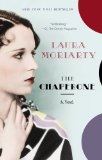Summary | Excerpt | Reading Guide | Reviews | Beyond the Book | Readalikes | Genres & Themes | Author Bio

"I'm sure they are," Cora murmured. "We vote."
"Don't be a cynic. They were much more specific than that. They know that there are serious women's issues at hand, and that women need to be in the fight." The ostrich feather bobbed as she spoke. "They're against all this modernization, all these outside influences on our youth. They're interested in racial purity, of course, but they're just as interested in teaching personal purity for young women. We do need to keep our race pure, and Good Lord, we need to keep it going. My brother-in-law says a veritable takeover is coming, and it's all being planned in the basement of the Vatican. That's the real reason Catholics have so many children, you know, and meanwhile, our people have one or two or none at . . ."
Viola trailed off. She rolled her lips in. It took Cora a moment to understand.
"I'm sorry," Viola said. "I didn't mean you. Your situation is different."
Cora waved her off. The twins were what she had. But both she and Viola were silent for a while, and there was only the tapping rain.
"In any case," Viola said finally, "I think it would be good for the girls. Good, moral people to mix with."
Cora swallowed, feeling short of breath. She had been wearing a corset day in, day out, for so many years that she rarely registered it as a discomfort. It seemed a part of her body. But in moments of distress, such as now, she was aware of her constricted rib cage. She would have to choose her words carefully. She could not come across as personally concerned.
"I don't know," she said, her voice breezy, not betraying her in any way. "Oh,Viola. The Klan? They wear those white gowns, those hoods with the spooky eyeholes." She fluttered her gloved hands. "And they have wizards and grand wizards, and bonfires." Even as she smiled, she glanced into Viola's small blue eyes, analyzing what she saw there. She had to consider her options, her best route to success. Viola was older, but Cora was richer. She would capitalize on that.
"It just seems a little... common." She shrugged, apologetic.
Viola cocked her head. "But lots of people are—"
"Exactly." Cora smiled again. She had chosen the right word, precisely. It was as if they were shopping at the Innes Department Store together, and Cora had shown disdain for an ugly china pattern. She already knew, with certainty, Viola would reconsider.
When the rain let up, they slid out and carried the crates in, sidestepping puddles, each woman making two trips. Inside, waiting for the librarian, they chatted about other things. They flipped through a pristine copy of Alice's Adventures in Wonderland, and smiled at the illustrations. They stopped at the Lassen Hotel for tea, and then Cora drove Viola home.
So many years later, this easy ride home with Viola would be the part of the story where Cora, in the telling, would momentarily lose the regard of a grandniece she adored. This grandniece, who at seventeen, incidentally, wore her hair much longer than her mother preferred, would be frustrated to the point of tears that in 1961 she was not yet old enough to join the freedom riders in the South. She often admonished Cora for using the word "colored," but she generally showed her more patience than she did her own parents, understanding that her aunt Cora was not a hateful person, just an old woman with tainted language.
But that patience was tested when she heard about Viola. Cora's grandniece couldn't comprehend why her great-aunt would remain friends with a woman who even considered being part of the Klan. Did she not know what they did to people? Her grandniece would look at Cora with scorn, and with forsaken, teary eyes. Had she been unaware of their cowardly crimes? Their murders of innocent people?
Yes, Cora would say, but in the end, Viola never joined. Only because she was a snob, her grandniece would counter. Not because the Klan was repugnant. It was a different time, was all Cora could say, defending her old friend, who would be long since dead by then. (Cancer. She'd started smoking after her daughters picked it up.) Consider the numbers, Cora would try. That rainy day with Viola was in the summer of 1922, when the Klan was six thousand strong in the city limits—and Wichita only held maybe eighty thousand souls in total. That wasn't unusual for the time. The Klan was strong and growing in many towns, in many states. Were people just stupider then - Meaner? Maybe, Cora allowed. But it was foolish to assume that had you lived in that time, you wouldn't be guilty of the same ignorance, unable to reason your way out. Cora herself had only escaped that particular stupidity because of her special circumstance. Other confusions had held her longer.
Excerpted from The Chaperone by Laura Moriarty. Copyright © 2012 by Laura Moriarty. Excerpted by permission of Riverhead Books. All rights reserved. No part of this excerpt may be reproduced or reprinted without permission in writing from the publisher.
There are two kinds of people in the world: those who divide the world into two kinds of people, and those who don'...
Click Here to find out who said this, as well as discovering other famous literary quotes!
Your guide toexceptional books
BookBrowse seeks out and recommends the best in contemporary fiction and nonfiction—books that not only engage and entertain but also deepen our understanding of ourselves and the world around us.